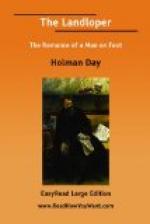Bristol did not reply.
“I have been studying you a little since I have known you,” the lawyer went on. “You are a very strange mixture, my boy. I much fear that in some things in this life you are too quixotic in your views. We had a case here in town—a man named Andrew Kilgour—”
“I have heard about that man, sir.”
“Thornton, from what glimpses I have had of your nature, I’m going to tell you here and now that you are covering somebody else’s fault. You are no coward. You would face your own delinquency just as bravely as you came here and faced me to-night. Now, what did your father do?”
“Speculated with trust funds of estates.”
“Old story, eh? Too bad, Morgan. I liked you when you were young.”
“But I want you to understand it,” cried the son. “It is hard for me to talk about it, sir, but it isn’t exactly the old story. My father was too indulgent where I was concerned. He tried to do more for me than he could afford. He didn’t tell me the truth about his affairs—I supposed he was a rich man. I always had everything that money could furnish. When he found that I was interested in the law he sent me to schools at home and abroad and ordered me to take my time and go to the bottom of all.”
“Well, I reckon you did,” stated Converse. “If ever I saw a chap with the true legal mind you have it, polished and pointed. You came into this state and saw a solution for a problem which has blocked us for twenty-five years. It’s good law! And we will have a legislature that will pass it. But when did you find out that your father had taken other folks’ money?”
“I came home and insisted on going to work in the office. Then he told me. The settlement was due and had been called for. He was obliged to tell me. And he tried to convince me that he had not taken the money for my sake. He was willing to appear in my eyes a thief without excuse. But I knew. I had selfishly accepted it all without thought—and only half grateful. Young men are thoughtless, sir.”
“Your father seems to have been quixotic after his own fashion, Thornton. I think I remember some of his traits when he was in school. But as old Hard-Times Brewster used to say, ’We are all poor, queer critters and some be queerer than the others!’ So you were a little queerer than your father, eh, and tried to square matters by a worse piece of folly?”
“It may have been folly. Perhaps it was. But I did not stop to argue or reason. That money had been spent on me. I accepted the blame. I said nothing to my father. I wrote letters to the persons who had lost. I told them that I had taken the money as my father’s agent—without his knowledge. I said I had deceived him as well as them. And then, so that I might not perjure myself on the witness-stand or have the truth gimleted out of me by lawyers, I put on rags and hid myself among the thousands who trudge the highways and ride the trusses of freight-cars. And no one has come to me and put heavy hand on my shoulder and said, ’I want you!’ But some one will come if I remain here. I am going to hide myself again.”




